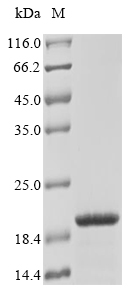Recombinant Mouse Translocator protein (Tspo)
CAT:
399-CSB-CF025168MO-01
Size:
100 µg
Price:
Ask
- Availability: 24/48H Stock Items & 2 to 6 Weeks non Stock Items.
- Dry Ice Shipment: No




Recombinant Mouse Translocator protein (Tspo)
- CAS Number: 9000-83-3
- Gene Name: Tspo
- UniProt: P50637
- Expression Region: 1-169aa
- Organism: Mus musculus
- Target Sequence: MPESWVPAVGLTLVPSLGGFMGAYFVRGEGLRWYASLQKPSWHPPRWTLAPIWGTLYSAMGYGSYIVWKELGGFTEDAMVPLGLYTGQLALNWAWPPIFFGARQMGWALADLLLVSGVATATTLAWHRVSPPAARLLYPYLAWLAFATVLNYYVWRDNSGRRGGSRLPE
- Tag: N-terminal 10xHis-tagged
- Source: in vitro E.coli expression system
- Field of Research: Cancer
- Assay Type: CF Transmembrane Protein & In Stock Protein
- Relevance: Can bind protoporphyrin IX and may play a role in the transport of porphyrins and heme. Was initially identified as peripheral-type benzodiazepine receptor; can also bind isoquinoline carboxamides. Promotes the transport of cholesterol across mitochondrial membranes and may play a role in lipid metabolism, but its precise physiological role is controversial. According to some reports, it is not required for steroid hormone biosynthesis.
- Purity: Greater than 85% as determined by SDS-PAGE.
- Activity: Not Test
- Length: Full Length
- Form: Liquid or Lyophilized powder
- Buffer: If the delivery form is liquid, the default storage buffer is Tris/PBS-based buffer, 5%-50% glycerol. If the delivery form is lyophilized powder, the buffer before lyophilization is Tris/PBS-based buffer, 6% Trehalose, pH 8.0.
- Reconstitution: We recommend that this vial be briefly centrifuged prior to opening to bring the contents to the bottom. Please reconstitute protein in deionized sterile water to a concentration of 0.1-1.0 mg/mL.We recommend to add 5-50% of glycerol (final concentration) and aliquot for long-term storage at -20℃/-80℃. Our default final concentration of glycerol is 50%. Customers could use it as reference.
- Molecular Weight: 21.7 kDa
- References & Citations: "High-throughput sequence identification of gene coding variants within alcohol-related QTLs." Ehringer M.A., Thompson J., Conroy O., Xu Y., Yang F., Canniff J., Beeson M., Gordon L., Bennett B., Johnson T.E., Sikela J.M. Mamm. Genome 12:657-663 (2001)
- Storage Conditions: The shelf life is related to many factors, storage state, buffer ingredients, storage temperature and the stability of the protein itself. Generally, the shelf life of liquid form is 6 months at -20℃/-80℃. The shelf life of lyophilized form is 12 months at -20℃/-80℃.
